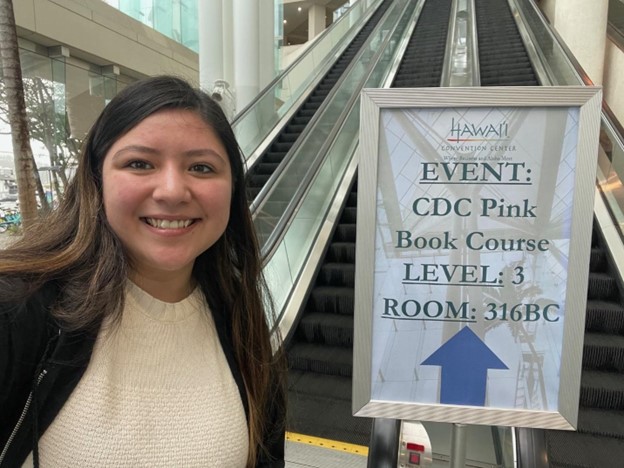By Magale Avitia, MPH, CHES, Illinois Chapter, American Academy of Pediatrics
What is your job?
I provide vaccine education to pediatric healthcare providers and Illinois community members. Sometimes the education can look like a webinar, putting together immunization resources, creating handouts, or an in-person community outreach event. In the last few months, I have also worked on immunization messaging for billboards and mobile advertising.
How long have you been working in this field?
I have been working as a public health professional for many years. My work has varied from working at organizations like Special Olympics to large university systems, and now I’m at a small but growing non-profit focused on pediatric health.
What level of education or training does this position require?
This position requires a bachelor’s degree or at least six years of relevant work experience.
What skills are needed to do this job well?
You need to be excellent at written and oral communication. I sometimes have to communicate complex information to individuals with varying levels of education. You need to be able to adapt your communication strategy based on your audience. Tailoring your message is vital to its success. What does success look like? Creating messages that connect with community members and their values is success. Success is when community members feel a sense of trust and confidence in the information they are receiving. They know that the action you recommend (ex. getting vaccinated) aligns with what is important in their day-to-day life (ex. protecting immunocompromised family members).
What is a typical day like for this career?
I start my day by checking my e-mail and making sure I get back to external partners and requests first. Then I get my to-do list together for the day and make sure I am prepared for any meetings for the day. My first half of the day is when most of my meetings are scheduled, where updates on project deliverables are given, planning for future events, and any barriers can also be troubleshooted. In the afternoon, I am able to make progress on my own work tasks, like reviewing the first draft of a toolkit, drafting emails to immunization funding awardees, or translating patient-facing materials into Spanish. My day-to-day does vary and sometimes I am preparing for an in-person event that requires setting up, facilitating, and networking.
Do you tend to work more independently or with other people?
My week is split 50/50 between working independently and working with others. Since our immunizations department oversees multiple grant-funded projects it is very important everyone (6 team members) are on the same page on tasks to meet grant deliverables in a timely manner. Sometimes that requires facilitating meetings with external partners and experts. You need to be a team player because public health work is rarely done alone. Teamwork is collaborating on projects, sharing resources, keeping each other updated, and asking for help when needed.
What do you wish you would have known about your job before starting?
A lot of the great public health work that goes on may not be recognizable or attributable to public health successes by the general public. This can lead to budget cuts for preventive work. For example, immunizations have received more attention since the COVID-19 pandemic but as it seems more under control and there is less concern about it, there may not be as much funding for immunization education moving forward. Public health funding can be unstable and contingency planning is needed.
What’s your least favorite thing about this job?
Immunizations can change every week. When COVID-19 vaccines first came out, there were constantly changing guidelines and recommendations. It was very difficult to keep up with the updates and sometimes more difficult to relay the changes to the public. Thankfully, I work with an amazing team that supports each other through the busiest of times and made the workload manageable.
What’s your favorite thing about this job?
I love being able to provide accurate health information so folks can feel empowered and confident when making decisions about their health. Being transparent is so important especially when working with communities who have low trust in healthcare systems due to systemic racism. Health literacy and health equity go hand in hand.
What advice would you give people who are interested in going into this field?
Don’t be afraid of creating change. It can be intimidating to raise concerns or bring forth new ideas to individuals with more power (ex. your supervisor, or CEO). Just because things have been done a certain way for long periods of time does not mean it should continue to be that way.
Resources:

